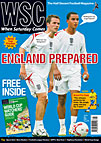 After an uninspiring three years in charge many Ipswich fans won't lose too much sleep over the departure of Joe Royle. Csaba Abrahall reports
After an uninspiring three years in charge many Ipswich fans won't lose too much sleep over the departure of Joe Royle. Csaba Abrahall reports
“You can stick your Joe Royle up your arse,” was the advice many in the Portman Road crowd offered the Ipswich board when it became clear that the former Oldham, Everton and Manchester City boss was to be the man to replace George Burley as Town’s manager. Three-and-a-half years after that unheeded protest, apparently after a routine meeting with David Sheepshanks revealed irreconcilable differences, Royle has unexpectedly departed. Few are disappointed.
As that welcome suggested, Royle was up against it from the start. His unpopularity stemmed not from his brief sojourn as a player at Norwich but from Ipswich’s duel with his Man City team for a promotion place in 2000. An exuberant pitch invasion following City’s final home game was seen in Suffolk as an arrogant celebration of promotion before it had been achieved. We were perhaps over- sensitive, but a simmering resentment towards that City team, their supporters and manager was born. Royle was also rumoured to have made disparaging comments about Ipswich at the time, though the lack of evidence produced since suggests that was something of a myth.
Twelve months later, Royle’s team were relegated at Portman Road, beaten by an Ipswich side that had long since secured UEFA Cup qualification. Town fans delighted in the revenge. How disconcerting, then, that our next sighting of Royle should be in the home dugout. Unquestionably, Burley had made errors in the interim that led to Ipswich’s relegation but, even so, it was hard to comprehend what now made Royle a better bet.
As if the hostile reaction to his arrival didn’t make the job difficult enough, circumstances quickly rendered it considerably more challenging. Within four months, Town were in administration, with the first of many players sold off. Royle was not able to sign a player for a fee during his first two years in the job.
Given that handicap, results have not been bad, as even Royle’s fiercest critics would concede. Though his principal objective – to return to the Premiership – has not been achieved, three creditable attempts out of four is a fair record. For Royle’s supporters, this has always been the strongest argument – who could have done better? For the sceptics, it has not necessarily been about doing better, but about doing things differently, and a significant number have remained unimpressed by Royle’s approach on and off the pitch.
Perceived as a conventional old hand and not the up-and-coming Ramsey- or Robson-type Ipswich supporters prefer, Royle further alienated many with a recruitment policy that favoured the physical ov-er the artful, delivering the previously unimaginable phenomenon of Georges Santos and Shefki Kuqi in Ipswich shirts. Kuqi was the great enigma who personified the Royle debate, with his supporters’ observation that he ran around an awful lot and scored a bunch of goals failing to shake his detractors from their opinion that he was, none the less, still rubbish. Furthermore, Royle’s commitment to bringing through the club’s academy products – something Town fans insist upon obsessively – was unconvincing. Instead, he would use experienced players out of position, or throw in a hastily signed loanee – Mark Fish’s calamitous and unnecessary 45-minute Ipswich career has already secured a place in Town folklore.
Royle’s public comments tended to gracelessness and did little for the club’s tarnished post-administration image. He would bridle at any criticism (famously calling local-radio reporter Brenner Woolley a “smart arse”) and would continually assert that his team were a good deal better than the usually reliable evidence of results and performances suggested. It became rather tiresome.
Royle has often said that Ipswich would be his last job, so it seems his management career may have reached its conclusion. His early success with Oldham remains tainted by the advantage offered by the plastic pitch, but is undeniably impressive. Eleven years on from his victory with Everton, he is still the last English manager to win the FA Cup, while his relegation at Manchester City followed consecutive promotions with a club that had become accustomed to failure. It has been an eventful and reasonably successful 25 years.
Only at Ipswich has nothing been achieved but, ironically, the final non-event of a season when Town finished in their lowest position for 40 years was seen as the most promising by many. Many of Town’s 2005 FA Youth Cup winners have been handed debuts; three are already first-team regulars. For the first time, there were signs that Royle was looking to the long-term. His tenure overall did little to change the fans’ preconceived ideas about him, but maybe he has left his successor something to build upon.
From WSC 233 July 2006. What was happening this month